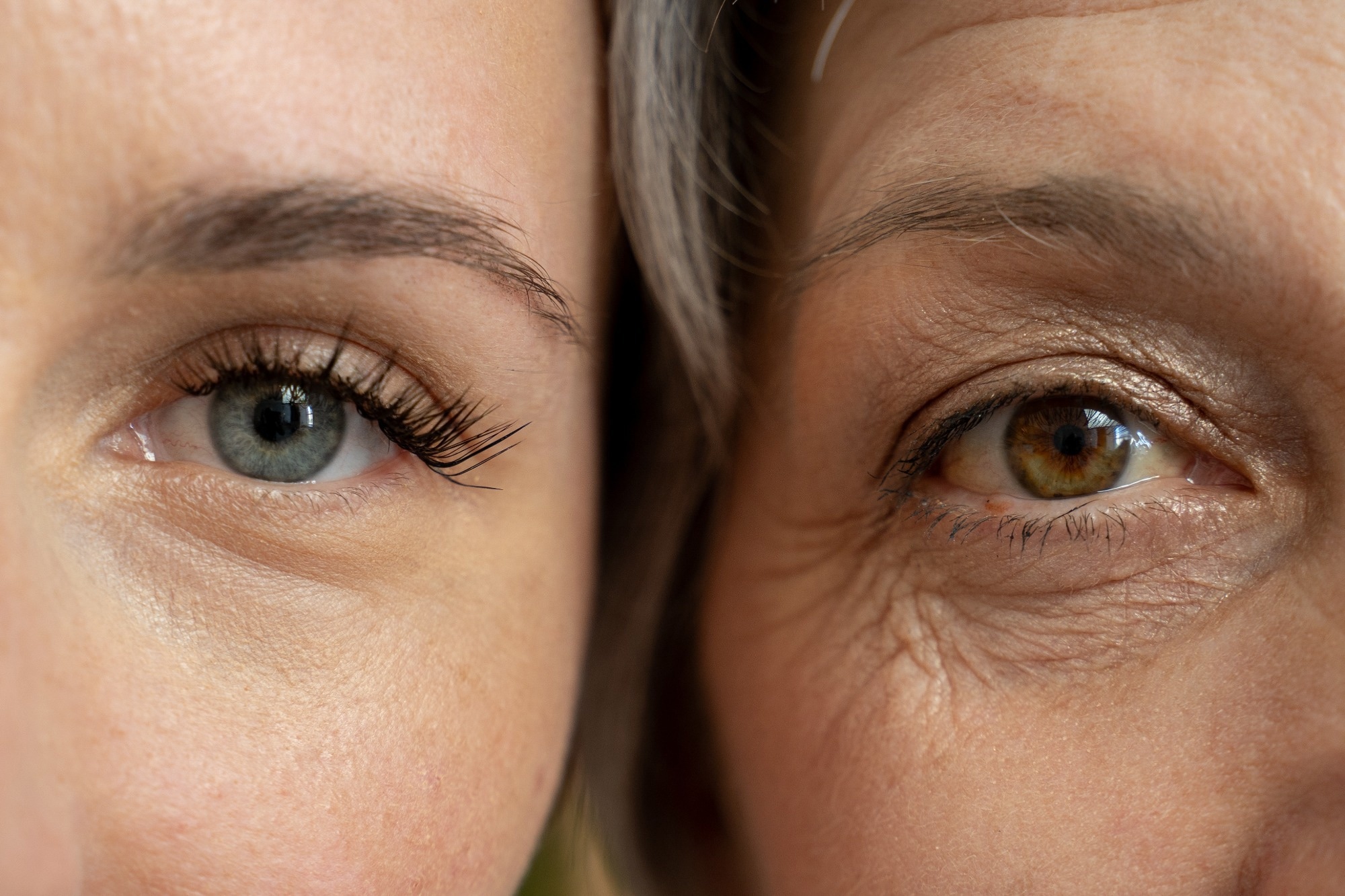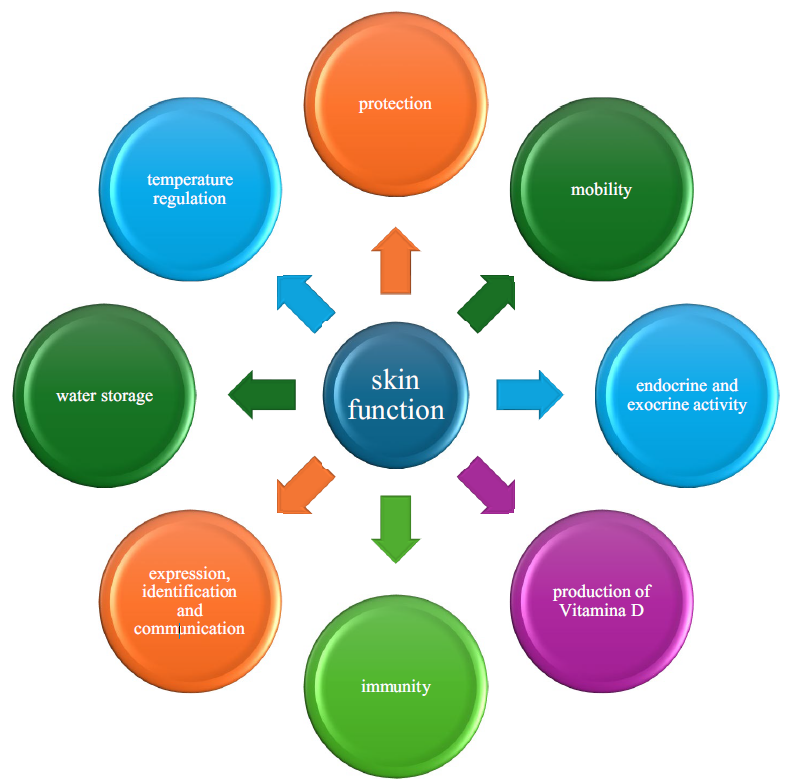Want to keep your skin looking younger for longer? This new review reveals how your daily food choices could be the secret weapon against wrinkles and premature aging.
 Review: Potential Role of Dietary Antioxidants During Skin Aging. Image Credit: Grustock / Shutterstock
Review: Potential Role of Dietary Antioxidants During Skin Aging. Image Credit: Grustock / Shutterstock
In a recent review published in the journal Food Science & Nutrition, researchers explored studies from the past five years on how dietary habits and specific foods influence skin aging, highlighting the differences between ‘skin-unfriendly’ behaviors and ‘skin-friendly’ ingredients. They concluded that foods rich in antioxidants can slow the process of skin aging, while diets high in refined sugars and trans fats accelerate it.
Skin: a critical sensory organ
The skin, making up about 15% of an adult’s body weight, acts as a protective, adaptable barrier. Consisting of three layers, the epidermis or outer layer, dermis or middle layer, and subcutaneous tissue or deep layer, it shields the body from physical damage, ultraviolet radiation, and infections.
The epidermis, mainly made of keratinocytes, acts as a waterproof barrier, protects against pathogens, and contains melanocytes that produce melanin to guard against ultraviolet damage.
The dermis supports skin strength and elasticity through collagen and elastin and contains blood vessels, nerves, glands, and hair follicles. The subcutaneous tissue or hypodermis, composed of fat and connective tissue, insulates the body, stores energy, and provides cushioning.
Skin functions include protection, temperature regulation, sensory perception, and immune defense. It maintains hydration, supports vitamin D synthesis via ultraviolet exposure, and excretes waste products like urea and ammonia.

Function of the skin.
It detects touch, pain, and temperature through nerve endings, and communicates emotions via muscle-linked responses. The skin also serves endocrine and exocrine roles by producing hormones and secreting substances such as sweat and sebum.
Overall, the skin acts as a complex interface between the body and the environment, playing vital roles in health, immunity, and homeostasis.
Skin ages naturally, and as a response to stress
As people age, physiological changes occur, including decreased regeneration and increased cellular damage.
Skin aging results from both internal (intrinsic) and external (extrinsic) factors. Intrinsic aging is a natural, time-dependent process involving reduced collagen and elastin production, diminished skin cell renewal, and thinning of the skin.
However, extrinsic aging is driven by environmental stressors like ultraviolet radiation, pollution, smoking, poor sleep, and an unhealthy diet, leading to wrinkles, pigmentation, and rough skin texture.
Molecularly, oxidative stress plays a central role by increasing reactive oxygen species (ROS), which damage skin proteins. This also triggers inflammatory pathways and enzymes that break down collagen.
Other contributing mechanisms include telomere shortening, genetic mutations, cellular senescence, chronic inflammation, and glycation, where sugars bind to proteins, forming advanced glycation end products (AGEs) that stiffen the skin. Collectively, they impair skin elasticity, hydration, and regeneration, accelerating visible aging signs.
While oxidative stress is a key player, skin aging is a complex interplay of inflammation, hormonal changes, and environmental damage. Researchers continue exploring molecular details to better understand and combat these effects.
The importance of diet for skin health
Recent research underscores the critical role of diet in maintaining skin health. Poor dietary habits disrupt skin functions and contribute to skin diseases, while nutrient-rich diets support skin repair and delay aging.
Antioxidants like vitamins A, C, E, polyphenols, and omega-3 fatty acids can mitigate aging by combating oxidative stress and reducing inflammation. Vitamin C supports the production of collagen, while vitamin E enhances the elasticity of the skin.
Peptides and proteins provide amino acids such as lysine and proline, which are also essential for collagen synthesis, and omega-3 fatty acids, which are found in chia, flaxseed, and fatty fish. These improve the barrier function and hydration of the skin.
Minerals such as copper, selenium, and zinc support antioxidant activity and enzymatic repair. Phytoestrogens, such as soy isoflavones, improve skin moisture and thickness, particularly in postmenopausal women. Prebiotics and probiotics support the skin microbiome, also protecting against ultraviolet damage, reducing wrinkles, and enhancing hydration.
The healthiest foods for skin include vegetables and fruits rich in polyphenols and carotenoids, like tomatoes, leafy greens, citrus, and berries, seeds (like chia and flax) and nuts (including pistachios and almonds), fermented foods, legumes, whole grains, healthy oils, and fatty fish like tuna and salmon. There is some evidence that fasting or caloric restriction can improve skin health. Experimental studies, especially in animal models, have shown that caloric restriction can slow the rate of skin protein glycation and reduce the accumulation of advanced glycation end products, helping to delay age-related changes in skin structure.
However, excessive sugar and unhealthy fats produce AGEs, which damage collagen and hasten aging. It is important to note that not all polyunsaturated fats are harmful to skin health. Omega-3 polyunsaturated fats, found in certain fish and seeds, are actually beneficial, whereas trans fats and excessive intake of some omega-6 fats may be detrimental. The unhealthiest diets for the skin include those high in trans fats (such as processed snacks and margarine), refined sugars, and those with low water intake (leading to rough, dry skin). Excessive consumption of refined carbohydrates and certain processed fats can negatively impact skin structure and appearance. Alcohol consumption in large quantities also damages the skin.
The review also highlights the rise of "nutricosmetics" and functional foods—products and ingredients designed to support skin health and appearance from within. These include functional foods fortified with bioactive compounds, as well as dietary supplements such as collagen peptides, hyaluronic acid, vitamins, and minerals, which are increasingly popular as part of holistic beauty and skin care strategies.
Conclusions
Diet plays a key role in skin aging, but its effects are complex and not yet fully understood. Antioxidants, omega-3 fatty acids, collagen-boosting nutrients, and phytonutrients may support skin health and slow aging, and daily intake of antioxidants from fruits and vegetables can reduce damage from oxidative stress.
However, more studies are needed to clarify how different diets affect skin structure and aging, especially considering individual and lifestyle differences. The review emphasizes that changing one’s diet is one of the most practical and effective interventions available to support skin health and delay the signs of aging.
Journal reference:
- Potential role of dietary antioxidants during skin aging. Tranchida, N., Molinari, F., Franco, G.A., Cordaro, M., Di Paola, R. Food Science & Nutrition (2025). DOI: 10.1002/fsn3.70231, https://onlinelibrary.wiley.com/doi/10.1002/fsn3.70231